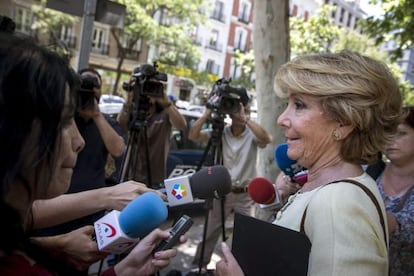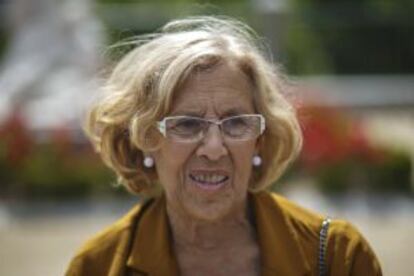Aguirre looks to rule in “concentration government” with Ahora Madrid
PP mayoral hopeful does U-turn after bid to leave Podemos-backed bloc out of office fails

Esperanza Aguirre, the conservative politician who narrowly won municipal elections in Madrid last Sunday but could miss out on becoming mayor thanks to a leftist coalition, has added a further twist to the complex political scenario unfolding in the Spanish capital.
After claiming that the runner-up and likely occupant of City Hall, Manuela Carmena of the left-wing bloc Ahora Madrid, wants to use the position “as a springboard to destroy our western democratic system,” Aguirre of the Popular Party (PP) met with the Socialists in a bid to forge an unprecedented alliance of traditional rivals in order to keep Ahora Madrid out of office.
It’s better with Carmena than against Carmena”
Begoña Villacís, Ciudadanos mayoral hopeful
Then, on Wednesday, Aguirre raised even more eyebrows when she suddenly expressed a willingness to govern the city jointly with Carmena, a 71-year-old judge who has become the visible face of a left-wing bloc that includes anti-austerity party Podemos.
This U-turn comes after both the Socialist nominee, Antonio Miguel Carmona, and the Ciudadanos contender, Begoña Villacis, rejected Aguirre’s offer to form a three-way government in the city and leave Ahora Madrid in isolation.
On Wednesday afternoon, the conservative politician proposed creating “a concentration government where everyone will be represented, including Carmena, but with a program that is supported by everyone, and dropping the proposals to create soviets in the city districts.”
The Ahora Madrid candidate responded to Aguirre’s claims against her on Twitter. “I have only been outside the democratic system when there still wasn’t one and I was fighting for it. Let’s get serious, please. Madrid needs it,” Carmena said.

Aguirre now denies that she ever claimed Carmena was not a democratic person.
But the head of the Madrid conservatives did insist that “she belongs to a political force, Podemos, whose leader Pablo Iglesias has already stated that he wants to change the western democratic system for a system he calls Bolivarian democracy.”
“Very likely it was our own mistakes that gave birth to Podemos, but we must not punish Madrileños with a Podemos government,” she told news agency Europa Press.
Ahora Madrid is a bloc made up of Podemos, Ganemos, green party Equo and former members of United Left, who all came together to run in the May 24 elections. The outcome of Sunday’s vote was a significant loss of support for the PP, although it remained the most-voted party overall. The next test will come in the fall, when Spain holds general elections.
In Madrid, Aguirre received 34.5% of the vote and secured 21 seats in the local council, followed by Carmena with 31.8% and 20 councilors, the Socialist Party with 15.3% and nine councilors, and Ciudadanos with 11.4% and seven seats. An absolute majority requires 29 seats, which Aguirre could only obtain with support from either the Socialists or Ahora Madrid. But the latter two are widely expected to form their own coalition to put Carmena in the mayor’s seat and leave Aguirre out.
Ciudadanos candidate Begoña Villacís said that while she was aware that her party did not hold the key to City Hall, she supports a concentration government because “that has to do with dialogue, with finding common ground, and that is a positive thing. It’s better with Carmena than against Carmena.”








































